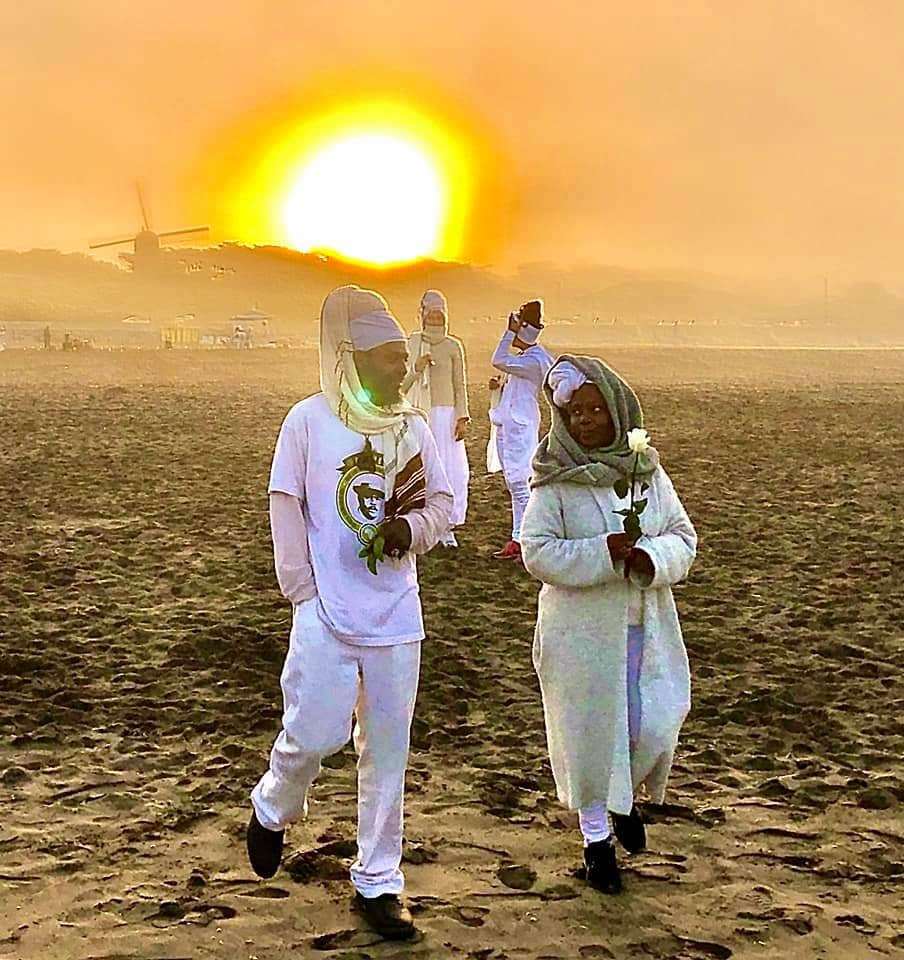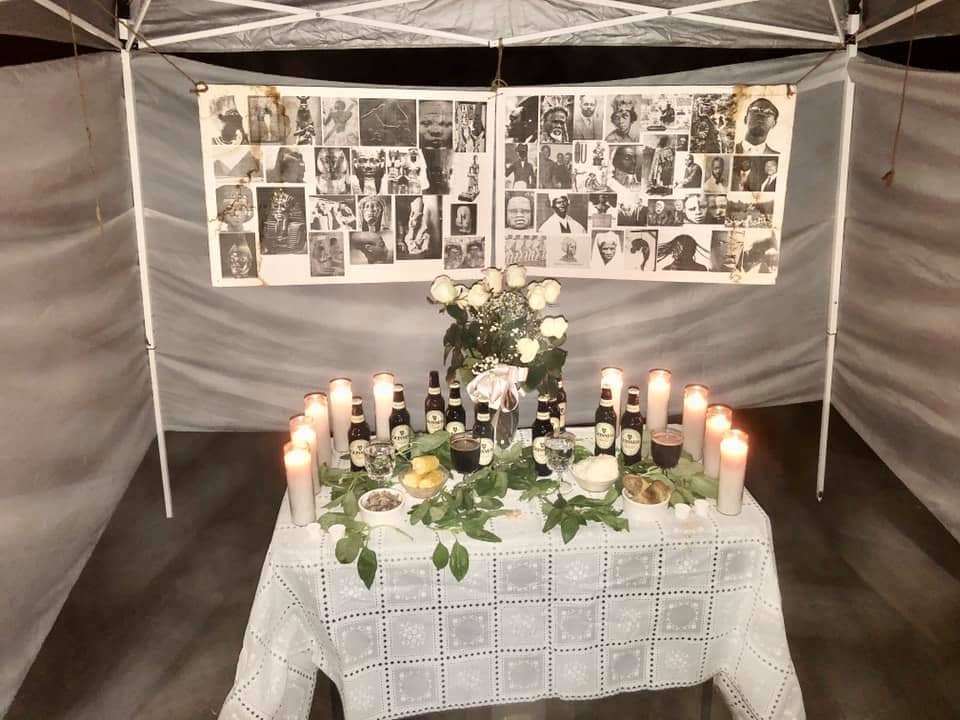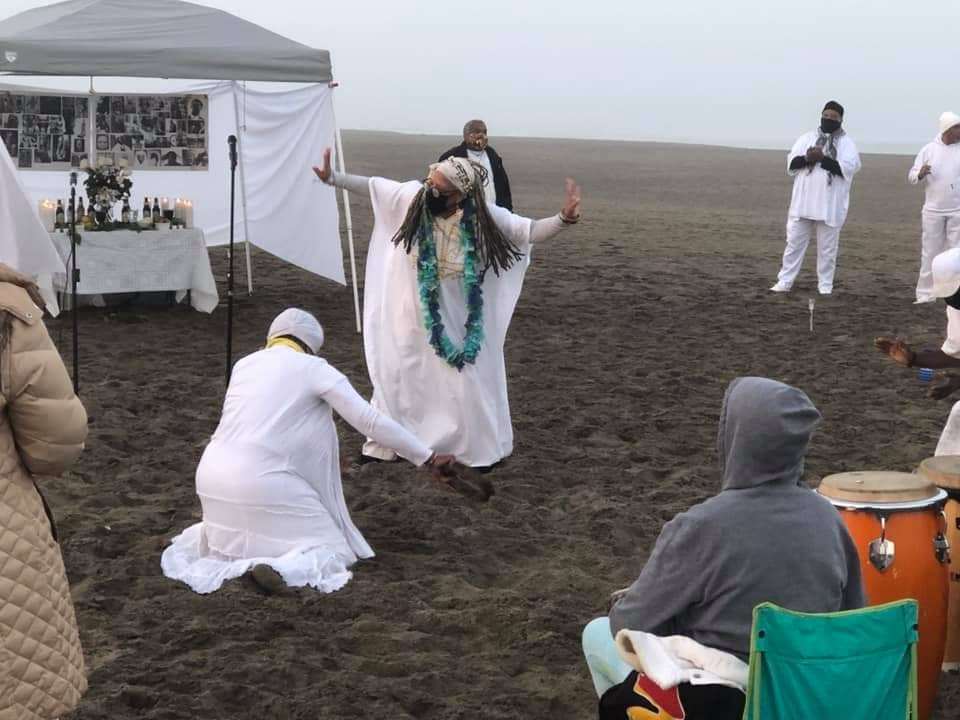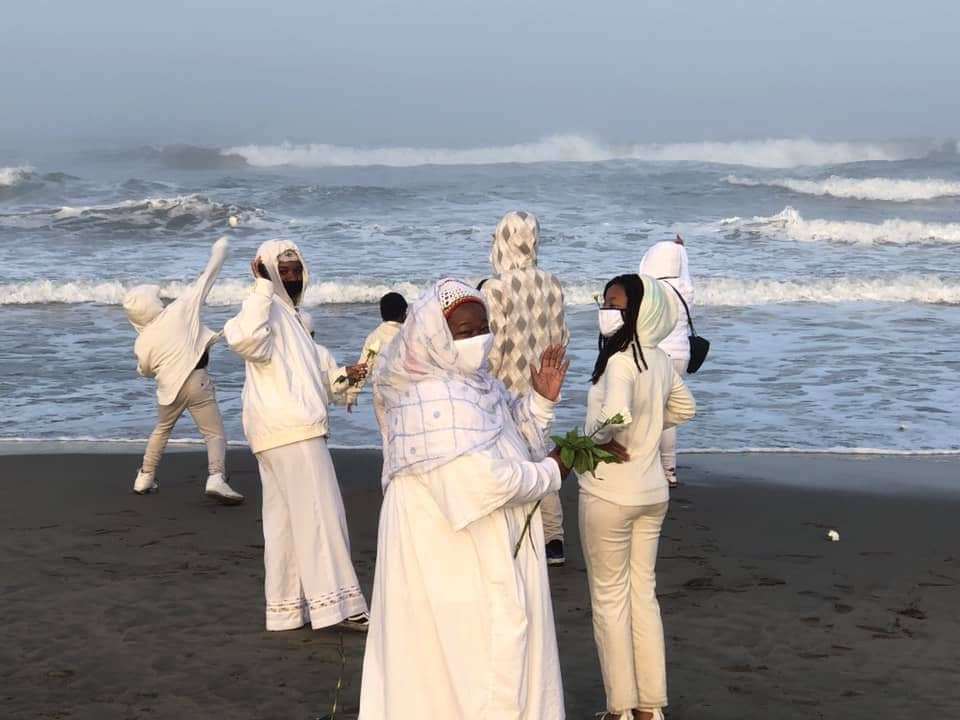
by Bay View Arts and Culture Editor Wanda Sabir
Who came up with the term “microaggression”? Probably the same tribe who invented the oxymoron, “white fragility.” My spellcheck, which is not “smart,” wanted to substitute “micro” for “macro”-aggression.
What has been my people’s experience in this nation warrants no box office hits to remind us – the rememory lives on in the tissues and bones of descendants of former captives monetized. Haile Gerima’s “Sankofa” could have been the definitive story, followed by, perhaps, Jordan Peele’s “Get Out!” a 21st century edition of the Let’s Get Rid of Black Freedmen’s Movement, which, framed as “repatriation,” was comprised of Southerners unhappy with the idea of free Africans as neighbors.
Fifty years before the Civil War, white men in the American Colonialization Society (1816-1964) began shipping free Africans from this hemisphere to land purchased in West Africa. Liberia was actually the first independent Black nation in 1839; however, its existence was not recognized until 1862. The whole shipping of free Black people to West Africa was a reversal of the slave trade, the agents – 15,000 of them – still Black, but no longer African.
Now there are comedies about the slave experience, like “Antebellum,” but it doesn’t matter if one of the two directors, Gerard Bush or Christopher Renz, claims ancestry in the terrible trafficking of human beings: He doesn’t get a pass. Black pain has always been marketable and as a topic juxtaposed to BLM, negates the latter – because all consumers remember is captivity even when the captivity is a genetic memory. Yes, there seems to be no escape in the latest screen adaptation.
In the Washington Post review from Sept. 9, 2020, the writer asks, “What makes a good slave movie?” What, indeed? Even “Harriet” (2019), which I enjoyed, made Black men evil and humanized and gave backstory to the enslavers. Yes, the writers hinted at a love triangle between the wayward “master” and, at that time, Mrs. Tubman.
Right. Sickening.
Popular exploitative renditions of Black pain sell ideas that perpetuate Black or African American inferiority and inhumanity, so when on Aug. 23 an act as atrocious as an unarmed young father Jacob Blake (29) being shot seven times in the back while his children sit nearby is acceptable – so acceptable the story disappears from the news. We see Black pain and Black death normalized.
But there is a way to diffuse this madness. What if Black people decided, as some have, to change their diet to a live-it – our consumption of images that promote who we are and where we see ourselves in the future, rather than the all too familiar nooses and chains and branding irons?
For us, this is not past. It is now.
There is nothing entertaining about Black pain. No other people’s pain is on the stock market except ours. Economists trade in Black life commodities, whether that is hypotheses on longevity which affect insurance eligibility, what companies will cover us and for how much: Believe me, we pay more for less.
We have not addressed the New Jim Crow: imprisonment. When Al Gore posits “an inconvenient truth,” he is talking about climate change, the floods and disappearing landmass. Another inconvenient truth which is not acknowledged is the fear that greets white America when it looks outside and sees Dark Matter.
I am not saying forget the past. It is impossible to forget this history when we live in a society where the production is expected. We want to remember our ancestors; however, the exploitation has to cease. The MAAFA is not a commodity; it is people, African ancestors remembered. It is a part of, as Dr. Marimba Ani [1] cites a three-part interrogation: Sankofa, Maafa, Ayaresa. Each element connected. See Dr. Ani’s “Let the Circle Remain Unbroken” and “Yurugu.”
I reflect on the sharpness of my tongue – I am so glad I didn’t say what I was thinking several times over the past month. We really do not know what another person has suffered and often this trauma affects how the person shows up. We need to cultivate empathy and learn to hold space distant enough to maintain objectivity.
It is impossible to forget this history when we live in a society where the production is expected. We want to remember our ancestors; however, the exploitation has to cease.
I recall when Sister Sheba was telling us about how she wrote the “Ritual of Forgiveness,” how the forgiveness came from an act of survival. When we can’t forgive, the “what” eats away at our lives until it, life, is gone. Sister Sheba suggested we start with family. Sometimes it feels easier to forgive strangers, co-workers, people with whom one does not share veins, heartbeat, bone marrow. I wonder how one forgives as the deed bleeds, the person without remorse? Drop me a line if you know.
In a world space where we do not see each other except through filters, we need to remain mindful of how easy it is to misinterpret language, especially written language. When the body is removed, there is more room for error, especially for melanin-kissed people. This distancing is just so not who we are.
I was talking to Brotha Clint, composer of “MAAFA We Remember You,” Monday about how I have developed a signal I use to greet other Africans, to let them know “I see you and wish you good health and prosperity.”
I put my right hand on my heart and nod towards the person if they look at me. We are criminalized for our packaging, which everyone loves when we are not wearing it. [2] I want to make sure the person knows it is the virus that keeps me away, not the person’s Blackness.

I think about not getting to see the altar on Sunday, Oct. 11, because whenever I looked over where it was situated, there were too many people crowded around it, not distanced. Neter Aa Meri had not read anything I sent him; however, he was completely finished when I arrived at 5:30 a.m. Perhaps if we’d spoken, he could have had people line up 6 feet apart so that we all could have an opportunity to commune with spirit.
I couldn’t micromanage that, since the bigger task was to place the solar lights 6 feet apart so people could see how to distance themselves. Melvin and I made a circle which included the altar and the space in front, where the speakers made presentations.
When I finally made it over to the altar, the food had been given to the ancestors and the items distributed to people gathered. [3] I was able to meet young people, two young women named after goddesses, Kali and MAAT, and a young man. Neter Aa Meri was elated to finally have some willing minds and hearts to teach this valuable practice.
I also missed the sunrise – it just went from dark to light. I saw Minister Alkebulan’s photos of the sunrise later. I think I was too caught up, in a good way, in the program. Brother Dar’s inviting melodies which called our ancestors, “Many Thousands Gone,” saying, “No more auction block for me / No more, no more / No more auction block for me / Many thousands gone / [No more tasers and chokeholds and knees on our necks … No more.]”
Dar ended with “Oh, Freedom.” From King Theo’s Holistic African Movement to Ava’s lovely choreography, which had us acknowledging our bodies in a good way, I think one of the themes on this 25th anniversary is certainly “Black Power,” or the Power inherent in our Blackness.
As we cleared the way for blessings to come and brushed away what was not serving us, reaching arms up literally for a higher power to assist us – African Ancestors – we then danced around the circle in a literal gathering of this power.

Desmond Iman followed Ava with the primal scream and then we ended with ringing of bells for 401 years of African American history (1619-2021). We started this tradition last year, when I learned that the Golden Gate Recreation Area, where Ocean Beach sits, did not acknowledge the National Parks Day of Healing hosted by Ft. Monroe National Monument, which is the site where, 401 years ago at Old Fort Comfort, Africans were traded for provisions, thus beginning the English Slave Trade. However, in California, the trade goes back 100 years earlier with the Spanish.
Uncle Bobby and Sister Beatrice joined us as well to say the names of people killed by police. Oct. 22 is Stolen Lives Project, a day set aside to compile a national list of all the people killed by police the year before. It is also Sister Sheba’s birthday. She is one of the founders of Stolen Lives.
She told me the funny story of how the date was chosen. Initially, organizers were looking at Oct. 12, Columbus Day, however, the thought was the Italians would not be happy, and considering Italians were a huge presence on the NYC police force, Oct. 22 was chosen. When presented with the date, Sister Sheba said, “It’s my birthday,” so while she was in NYC, comrades would get a chocolate cake for her to celebrate after the Stolen Lives events ended.
Some of us could feel the energy of the ancestors traveling through our feet and into our legs, hips and abdomens and into the heart chakra.
Listen to Wanda’s Picks Radio, Wednesday, Oct. 21, 8:00 a.m., when Sister Sheba joins us to talk about her work in police accountability, the Black Panther Party and public health. She might even share a poem. Oct. 22 is also the birthday of Bobby Seale, co-founder of the Black Panther Party. My father, Fred Batin, was born this day too.
At the ceremony Sunday morning, I shared some thoughts on the Slave Rebellion Reenactment November 2020, hosted by Dread Scott, originally from Chicago and now living in New York. He’s an artist whose work disrupts as it invites the silenced to speak. His name invokes Black humanity and the Dred Scott case where, just in case our ancestors thought themselves mistaken, the highest court reiterated the claim that Black people were not created equal to white men or white women.
In fact, Mr. Scott’s assertion that since he lived in a free state, shouldn’t he be a free man, was met with the ruling that Black people were not citizens of this nation, therefore could not use the court to file charges against a slave owner for his captivity. This was in 1857.
The Slave Rebellion Reenactment last year in east Louisiana up from NOLA referenced the largest rebellion in U.S. history, in January 1811. Encouraged by news of the Haitian revolution, Africans took their freedom, and white folks ran.
As we walked the road, bayous on one side, old plantations on the other – along with petrochemical plants spewing poisons into the air, spilling into the water, killing everything walking, crawling or flying – some of us could feel the energy of the ancestors traveling through our feet and into our legs, hips and abdomens and into the heart chakra.

We marched holding our machetes, cane knives and rusty muskets. It was freedom or death.
By the time I got to NOLA, my ancestors dead, heads chopped off and put on spikes along the road we’d just travelled, I was ready for freedom. My body ached, I was hungry and tired and ready for revolution or death.
I was feeling like chopping off heads, especially when we passed a house where this evil woman tortured her enslaved persons so horribly, she was fined. I think the Africans burned the house down.
When we got to Congo Square, the weary soldiers were treated like royalty, and we were. We were our ancestors reimagined, and the freedom they died for we need to treasure and say, “Never again.”
“Before I be a slave / I be buried in my grave / And go home to my lord and be free.”
Thanks to all the participants at the Living Maafa Ritual at Ocean Beach in San Francisco, and to the presenters at the virtual ritual later that same morning. I have attached the program with links. The audio links do not work, unfortunately. You can watch the complete program for both at these links:
Virtual 25th Annual MAAFA Commemoration, Part I
Virtual 25th Annual MAAFA Commemoration, Part II
Thanks to Brother Kwalin Kimathi, who hosted the first program (and gave tech support, as did Sister Koren Clark) and to Brotha Clint and Sister Afua, who joined him on Zoom to talk about the MAAFA tradition in the Bay. We also want to thank Melvin Phillips, who videotaped the livestream broadcast, and thanks to Brother Che and the other men from Community Ready Corps for onsite security. Special thanks to King Theo Aytchan Williams, Iya Ava Square, Iya La Tanya Carmical, Ayikwe Scott, Baba Darinxoso Oyamasela, Ministers Alicia Teasley and Imhotep Alkebulan, Desmond Iman, Brother Neter Aa Meri and his assistants – Sistar Gwendolyn “Sunrise” Traylor, Brother Cephus “Uncle Bobby” Johnson and Sister Beatrice X Johnson.
For the second part of the 25th Anniversary of MAAFA SF Bay Area, we want to thank Sister Karla Brundage for her tech support, Sister Koren Clark for tech support, Sister TaSin Sabir for her website and media development, Brother Mike Jackson, Montgomery MAAFA and ICCAAMP for his media support, and of course all the contributors to the Virtual 25th Annual MAAFA commemoration in order of appearance:
Sister Wanda Sabir, host; Sister Opal Palmer-Adisa, Ph.D.; Brotha Clint; Baba Kola Thomas; Seestah IMAKHÜS Njinga Okofu Ababio, Brother Alonzo “Zochi” Young, Ethiopia; Iya Mahealani Uchiyama; Aishah Bashir and her mom: revered ancestor, Iya Jaquelyn Hadiah McLeod; Tarika Lewis on her cousin, revered ancestor, Sister Makinya Kouyate; Baba Ustadi Kadiri and Sister Bisola Marignay on revered ancestor, Brother Tahuti; Ms. Nia McAllister; Sister Bisola Marignay, Ph.D.; Iya Queen Hollins, Earthlodge; Iya Osotunde aka Mama C (Tanzania); Kumasi – Black Liberation Pledge; Dr. Francis Cress Welsing, MD., revered ancestor, “A Liberating Black People’s Prayer for Peace” (©1996); Ms. Koren Clark on her father, honored ancestor Dr. Syed Malik al Khatib (1940-2014); Minister Alan Laird, M.Div; Baba Eddie Abrams, Umoja House; Karla Brundage, The Black Arts Movement; Minister Mxolisi, M.Div., Wo’se co-founder; Sister Piwai, Zimbabwe; Sister Omitola Akinwunmi, Uganda (she will lead the Virtual Maafa Townhall Workshop Nov. 22, 2-4 p.m., on Zoom; Sistar Gwendolyn “SunRise” Traylor; Brother Mehib Holmes, Atlanta, Ga.; Sister Kharyshi Wiginton, “MeToo,” Texas; Brother Bryant Bolling and Sistar Zakiyyah Capehart-Bolling; Honored ancestor John Coltrane for his “Love Supreme;” and to all those who are a part of the MAAFA Commemoration SF Bay Area global family.
Don’t forget to visit the MAAFA SF Bay Area boutique for gifts.
[1] More biographical information on Dr. Marimba Ani: http://www.hartford-hwp.com/archives/30/084.html
[2] Paradise Free Ja Love’s anthem “I Love Everything about You … But You!”
[3] I would have liked a candle to mark this 25th anniversary, but the helpers kept walking past me and instead handing them to those on my left and right.





